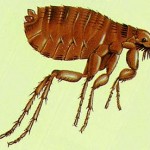READY TO GET STARTED?
REQUEST A FREE ESTIMATE
Fill out the form below or call (888) 466-7849 for a free, no-obligation estimate.
How can something as small as a flea be such a huge pain? Pet owners are all too familiar with the annoyance of fleas because they make us AND our pets miserable. Fleas attach themselves to warm-blooded animals (pets and humans) and feed on their blood. A flea bite can cause discomfort, painful, itchy red bumps and can lead to an allergic reaction. In some cases, they can even transmit diseases like the bubonic plague, murine typhus and transfer tapeworms in pets.
To prevent fleas from becoming a pest in your home, clean and vacuum frequently. A clean home is a healthy home and will aid in the prevention of other pests as well. Cleaning will help to remove any fleas and their eggs. Maintaining a clean yard is just as important, especially if you have pets that go outside often. A well kept lawn with no debris or pet droppings will reduce the flea population around your home. Bathe pets regularly and apply a flea and tick treatment. Most importantly, call a professional exterminator if you have fleas in your home. A flea infestation can be very difficult to get rid of and is best left to the professionals so the problem does not continue to grow.
Interesting Flea Facts:
Got a flea problem? Call Northwest Exterminating for professional, effective flea control.
How can something as small as a flea be such a huge pain? Pet owners are all too familiar with the annoyance of fleas because they make us AND our pets miserable. Fleas attach themselves to warm-blooded animals (pets and humans) and feed on their blood. A flea bite can cause discomfort, painful, itchy red bumps and can lead to an allergic reaction. In some cases, they can even transmit diseases like the bubonic plague, murine typhus and transfer tapeworms in pets.
To prevent fleas from becoming a pest in your home, clean and vacuum frequently. A clean home is a healthy home and will aid in the prevention of other pests as well. Cleaning will help to remove any fleas and their eggs. Maintaining a clean yard is just as important, especially if you have pets that go outside often. A well kept lawn with no debris or pet droppings will reduce the flea population around your home. Bathe pets regularly and apply a flea and tick treatment. Most importantly, call a professional exterminator if you have fleas in your home. A flea infestation can be very difficult to get rid of and is best left to the professionals so the problem does not continue to grow.
Interesting Flea Facts:
Got a flea problem? Call Northwest Exterminating for professional, effective flea control.
 It is a common misconception that if you don’t have animals in your home that you can’t get fleas…FALSE. Fleas can be an issue in homes both with and without pets. They often attach themselves to rabbits, skunks, possums, and other rodents or wildlife that can be found living in wooded areas around a structure. Their 6”-8” vertical jump gives them the ability to attach themselves to humans and animals.
It is a common misconception that if you don’t have animals in your home that you can’t get fleas…FALSE. Fleas can be an issue in homes both with and without pets. They often attach themselves to rabbits, skunks, possums, and other rodents or wildlife that can be found living in wooded areas around a structure. Their 6”-8” vertical jump gives them the ability to attach themselves to humans and animals.
The thought of fleas creates a sense of uneasiness…and with good reason; fleas can carry several diseases like plague, tapeworm, and murine typhus that effects humans and pets alike. Flea prevention is much easier and less expensive than flea treatment.
Flea Prevention Tips:
Do it yourself flea treatments can be effective. However, we would like to warn you that flea exterminating is a difficult task and more often than not should be done by a professional exterminating company like Northwest Exterminating. When getting rid of fleas yourself, keep in mind that fleas can lay up to 50 eggs per day. Only 5% of the flea population is on your dog or other household pets, the rest have fallen off in and around your home.
DIY Flea Treatments:
Disclaimer: Northwest Exterminating does not encourage the use of the following treatments. We strongly recommend that all instructions are carefully followed on packaging of the following products and hold no liability for the following DIY treatments. Please contact a doctor, veterinarian and a professional pest control company before trying any of these treatments.
If you have tried DIY flea control methods without any luck, a pest control professional is your best option. A good exterminating company will be knowledgeable about flea prevention and treatment and should treat your home until fleas are gone.
If you’re looking for flea control in the Atlanta, Savannah, Nashville, or Columbus areas Northwest Exterminating is your best choice. Visit us at callnorthwest.com or call at 888.466.7849
Have you tried any of these DIY flea treatments?
Additional links:
https://www.callnorthwest.com/2011/08/facts-about-ticks-and-fleas/
https://www.callnorthwest.com/2011/06/dog-fleas/